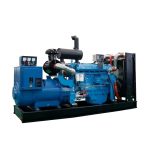Introduction
Diesel generators are commonly used in various industries, businesses, residential areas, and even as backup power sources in case of emergencies. These generators play a crucial role in ensuring continuous power supply, especially in locations where grid power is unreliable or unavailable. However, concerns about environmental impact and energy efficiency have led to the establishment of efficiency standards for diesel generators. In this article, we will explore the importance of efficiency standards for diesel generators, the regulations governing them, and the benefits of using efficient diesel generators.
Importance of Efficiency Standards for Diesel Generators
Efficiency standards for diesel generators are essential for several reasons. First and foremost, energy efficiency helps reduce fuel consumption, leading to cost savings for users. Diesel fuel is a significant expense for businesses and industries that rely on generators for their power needs. By improving the efficiency of diesel generators, users can reduce their fuel consumption, resulting in lower operating costs and improved profitability.

Secondly, energy efficiency standards for diesel generators help reduce greenhouse gas emissions and mitigate environmental impact. Diesel generators are known to produce emissions such as nitrogen oxides (NOx), particulate matter, and carbon monoxide, which contribute to air pollution and climate change. By setting efficiency standards, regulators can encourage manufacturers to develop cleaner and more efficient diesel generators, thereby reducing their environmental footprint.
Moreover, efficiency standards for diesel generators promote technological innovation and drive industry competitiveness. Manufacturers are incentivized to invest in research and development to improve the efficiency of their products to meet regulatory requirements. This leads to the development of advanced technologies, such as electronic controls, variable speed engines, and improved combustion systems, which not only enhance efficiency but also improve overall performance and reliability of diesel generators.
Regulations Governing Efficiency Standards for Diesel Generators
Efficiency standards for diesel generators are established and enforced by regulatory bodies at the national and international levels. These standards set minimum efficiency requirements that diesel generators must meet to be considered compliant. diesel generator efficiency following are some of the key regulations governing efficiency standards for diesel generators:
1. United States Environmental Protection Agency (EPA) Standards: The EPA sets emissions and efficiency standards for diesel engines, including those used in generators. The EPA Tier standards specify maximum allowable emissions of pollutants such as NOx, particulate matter, and hydrocarbons, as well as minimum efficiency requirements for diesel engines.
2. European Union (EU) Ecodesign Directive: The EU Ecodesign Directive sets energy efficiency requirements for various products, including diesel generators. Manufacturers must comply with the directive by designing and producing generators that meet specified efficiency levels and emissions limits.
3. International Organization for Standardization (ISO) Standards: The ISO develops international standards for a wide range of products, including diesel generators. ISO standards such as ISO 8528 specify performance and efficiency requirements for different types of generators, ensuring consistency and quality across global markets.
4. National Regulations: Many countries have their own regulations governing the efficiency of diesel generators. These regulations may vary in stringency and scope but generally aim to promote energy efficiency, reduce emissions, and ensure the reliability of power generation equipment.
Benefits of Using Efficient Diesel Generators
Using efficient diesel generators offers a wide range of benefits for users, the environment, and society as a whole. Some of the key benefits of using efficient diesel generators include:
1. Cost Savings: Efficient diesel generators consume less fuel per unit of power generated, resulting in lower operating costs for users. By investing in an efficient generator, businesses and industries can reduce their fuel expenses and improve their bottom line.
2. Environmental Protection: Efficient diesel generators produce fewer emissions, helping to reduce air pollution and mitigate climate change. By using cleaner and more efficient generators, users can minimize their environmental impact and contribute to a healthier and more sustainable planet.
3. Reliability and Performance: Efficient diesel generators are more reliable and offer better performance compared to older, less efficient models. They are less prone to breakdowns, operate more smoothly, and provide stable power supply, ensuring uninterrupted operations for businesses and critical facilities.
4. Compliance with Regulations: Using efficient diesel generators allows users to comply with regulatory requirements and avoid penalties for non-compliance. By choosing generators that meet or exceed efficiency standards, users can demonstrate their commitment to sustainability and responsible energy management.
5. Improved Reputation: Adopting energy-efficient practices, including using efficient diesel generators, can enhance a company's reputation and brand image. Consumers, investors, and other stakeholders increasingly value sustainability and environmental responsibility, making energy efficiency an important criterion for businesses to showcase their commitment to social and environmental stewardship.
Conclusion
Efficiency standards for diesel generators play a crucial role in promoting energy efficiency, reducing emissions, and driving technological innovation in the power generation industry. By setting minimum efficiency requirements, regulators incentivize manufacturers to develop cleaner, more efficient diesel generators that offer a range of benefits for users, the environment, and society. Businesses and industries that invest in efficient diesel generators stand to gain cost savings, environmental protection, improved performance, regulatory compliance, and enhanced reputation. As the demand for reliable and sustainable power sources continues to grow, the importance of efficiency standards for diesel generators will only increase, driving the development of advanced technologies and cleaner energy solutions for the future.
